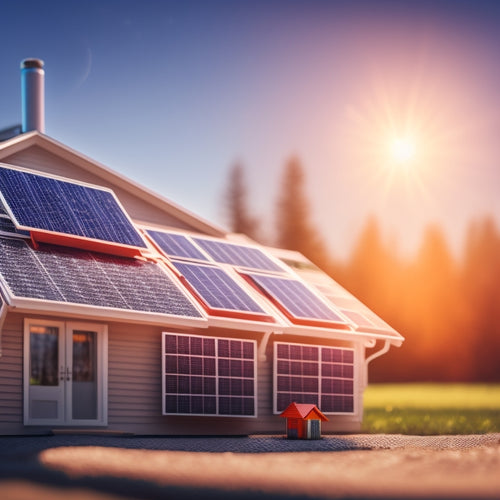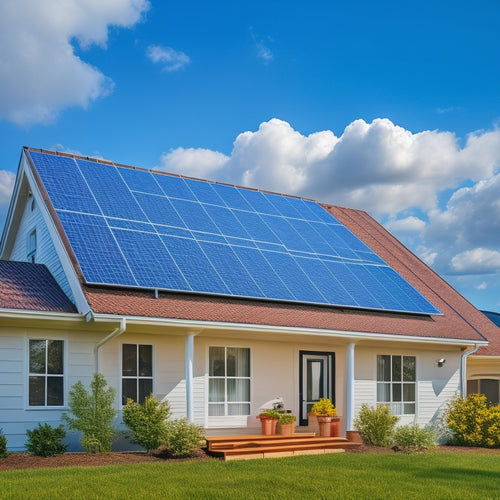
Top Features of a Home Battery Backup System
Share
Home battery backup systems provide essential features that guarantee your home stays powered during outages. They deliver reliable energy storage, maintaining operation of critical devices like medical equipment and communications. With long-term cost savings, you can save hundreds annually by storing excess energy. Their efficiency, measured in kilowatt-hours, allows for longer power supplies while matching your unique energy needs. Additionally, these systems typically require less maintenance than traditional generators, enhancing reliability and lifespan. By understanding these key features, you can make an informed choice for your energy independence and resilience, which is vital for any household.
At a Glance
- Provides reliable power during outages, ensuring critical appliances remain operational and enhancing household comfort and security.
- Offers significant long-term cost savings by reducing energy bills and benefiting from federal and state financial incentives.
- High energy storage capacity allows for extended power supply during outages and enhances grid independence, especially when paired with solar systems.
- Features high round-trip efficiency, typically between 80% to 95%, ensuring maximum usable energy after storage and minimizing waste.
- Requires minimal maintenance compared to traditional generators, leading to increased reliability and a longer system lifespan.
Reliable Power During Outages
When power outages occur, having a home battery backup system guarantees an uninterrupted energy supply, allowing you to maintain essential functions in your household.
This reliability is essential for emergency preparedness, as it enables you to power critical appliances and devices during important times.
Additionally, battery backup systems provide necessary power during grid failures, enabling continuous operation of lights, refrigerators, and medical equipment, which is especially important for those in rural areas.
Uninterrupted Energy Supply
A home battery backup system guarantees an uninterrupted energy supply, providing reliable power during outages that can disrupt daily life. By capturing energy from renewable sources, these systems not only enhance your energy independence but also make certain that your home remains powered when the grid goes down. This grid independence is vital, as it liberates you from reliance on utility companies during emergencies.
When integrated with solar panels or wind turbines, a battery backup system can store excess energy generated during peak production times. This renewable integration maximizes your energy efficiency and allows you to leverage clean energy even when the sun isn't shining or the wind isn't blowing. As a result, you'll experience consistent power availability, regardless of external conditions.
Moreover, a well-designed battery system can seamlessly shift to backup mode, guaranteeing that critical appliances and devices remain operational without interruption. This reliability is fundamental for maintaining day-to-day activities and safeguarding your household's comfort and security.
Essential for Emergency Preparedness
Emergency preparedness hinges on having reliable power sources at your disposal, and a home battery backup system serves as an indispensable component in this equation. When you're faced with unexpected power outages, whether due to natural disasters or other emergencies, your ability to maintain essential functions depends on a dependable energy reserve. This is where a battery backup system comes into play, guaranteeing that your home remains operational even when the grid fails.
Integrating a home battery backup into your disaster planning not only enhances your safety protocols but also offers peace of mind. You'll be able to power significant devices like medical equipment, communication tools, and refrigeration, which are crucial during emergencies.
Furthermore, these systems can be integrated with solar panels, further increasing your energy independence and resilience.
In essence, investing in a home battery backup system isn't just about convenience; it's a strategic move toward enhancing your overall preparedness. By securing a reliable power source, you're not only safeguarding your home but also equipping yourself to manage emergencies with confidence and autonomy.
This proactive approach guarantees you're ready for whatever challenges may come your way.
Cost Savings Over Time
Investing in a home battery backup system can lead to significant cost savings over time.
By storing excess energy, you can reduce your energy bills, especially during peak usage hours. These systems operate quietly and efficiently, allowing you to maximize savings while maintaining essential appliance functionality during outages.
Additionally, many regions offer incentives and rebates that can further offset your initial investment, making the system even more financially attractive eco-friendly solutions.
Reduced Energy Bills
Cost savings emerge as a significant advantage of home battery backup systems, altering how homeowners manage their energy consumption. By storing excess energy generated from renewable sources, you reduce reliance on the grid, achieving energy independence. This shift not only lowers your energy bills but also minimizes your environmental impact.
Here's a breakdown of potential savings:
| Time Period | Estimated Savings | Benefits |
|---|---|---|
| Monthly | $30 - $50 | Reduced utility costs |
| Yearly | $360 - $600 | Increased energy independence |
| 5 Years | $1,800 - $3,000 | Significant long-term savings |
| 10 Years | $3,600 - $6,000 | Greater financial freedom |
| 20 Years | $7,200 - $12,000 | Enhanced sustainability |
With a home battery backup system, you're not just cutting costs; you're investing in a greener future. The cumulative savings over time can be substantial, freeing up resources for other priorities while contributing positively to the environment. Embracing this technology enables you to take control of your energy use and enhance your financial resilience.
Incentives and Rebates
Many homeowners are unaware that additional financial benefits can come from government incentives and rebates associated with home battery backup systems. By investing in these systems, you not only secure your energy independence but also position yourself to take advantage of various federal programs and state incentives designed to promote renewable energy adoption.
Federal programs often include tax credits, allowing you to deduct a significant percentage of your battery system's cost from your taxable income. This can lead to substantial savings upfront, enhancing your return on investment.
Additionally, many states offer their own incentives, such as rebates or grants, which can further reduce installation costs and make these systems more accessible.
Moreover, some utilities provide programs that reward customers for using battery storage to alleviate grid demand during peak times. By participating, you can earn credits on your energy bills, creating a continuous cycle of savings.
In essence, these financial incentives not only lower your initial expenses but also contribute to long-term savings, enabling you to utilize energy autonomy while reducing your overall carbon footprint.
Seize these opportunities and experience the freedom that comes with a home battery backup system.
Battery Capacity and Efficiency
When evaluating battery capacity and efficiency, you'll want to assess both energy storage capacity and the charge and discharge rates.
These factors directly impact how much energy your system can store and how quickly it can deliver that energy when needed.
Additionally, selecting batteries with high round-trip efficiency can minimize energy losses during operation, further enhancing performance.
Understanding these specifications helps you optimize your home battery backup system for your specific energy demands, especially when evaluating advanced battery management systems that monitor performance and extend battery life.
Energy Storage Capacity
Understanding energy storage capacity is important for selecting a home battery backup system that meets your needs. The capacity, usually measured in kilowatt-hours (kWh), indicates how much energy the battery can store. A higher capacity allows you to power your home for longer periods during outages, enhancing your grid independence.
When considering solar integration, it's essential to match your battery's capacity with your solar panel output. If your system can produce more energy than the battery can store, you might miss out on potential savings and efficiency. As a result, evaluate your energy consumption patterns alongside the battery's capacity to guarantee you maximize your investment.
Efficiency also plays a significant role in energy storage. A battery's round-trip efficiency reflects how much energy you can effectively use after it's stored, typically ranging from 80% to 95%.
This efficiency impacts how much energy you can rely on during outages, contributing to your overall energy strategy.
Charge and Discharge Rates
Charge and discharge rates are crucial metrics that directly impact your battery backup system's performance and efficiency. Understanding these rates allows you to gauge how quickly your system can store energy and release it when needed.
Charge cycles refer to the complete process of charging and discharging a battery, and the more cycles your battery can handle, the longer its lifespan will be.
Discharge efficiency is another important aspect; it indicates how effectively your system converts stored energy into usable power. A high discharge efficiency means that less energy is wasted during the process, maximizing your battery's output. For example, if your battery has a discharge efficiency of 90%, it means 90% of the stored energy is available for your usage, while 10% is lost.
When evaluating your battery backup system, pay attention to both charge and discharge rates. A system that combines high charge rates with excellent discharge efficiency guarantees that you can rapidly store energy during off-peak times and effectively employ it during power outages.
This balance is crucial for achieving autonomy and independence in your energy consumption.
Selecting Based on Energy Usage
To select the right home battery backup system, you need to analyze your energy needs carefully.
Start by evaluating your peak consumption during high-demand periods, as this will inform the capacity required for the battery.
Additionally, it's essential to examine your daily habits and appliances to identify overall energy consumption, especially during important peak hours.
Understanding these factors guarantees that your system can effectively support your household during outages and provide accurate energy calculations for ideal battery sizing.
Analyze Energy Needs
Analyzing your energy needs is vital for selecting the right home battery backup system. Start by reviewing your current energy consumption patterns. Understand how much energy you employ daily and identify the key appliances or systems that require backup power during outages. This step provides a solid foundation for determining the size and capacity of your battery system.
Consider solar integration when evaluating your energy needs. If you have or plan to install solar panels, the battery system should complement your solar setup, allowing for energy storage during peak sunlight hours. This collaboration not only enhances your energy independence but also maximizes the overall efficiency of your system.
System scalability is another significant factor. Choose a battery backup system that can grow with your energy demands. As your household's energy needs change, whether due to adding more appliances or expanding your solar array, your battery should adapt accordingly.
Assess Peak Consumption
Once you've established your energy needs, the next step is to evaluate your peak consumption. This process is vital because it determines how much energy your home requires during its highest demand periods.
Start by utilizing energy monitoring tools to track your usage patterns. These devices can provide real-time data, allowing you to identify when peak demand occurs, whether during mornings or evenings.
Understanding your peak consumption helps you choose the right home battery backup system. If your peak demand exceeds your battery's capacity, you might experience outages or insufficient power during important times.
Evaluating your peak consumption also enables you to optimize your energy use, potentially reducing your reliance on the grid and enhancing your energy independence.
Consider the appliances that draw the most power, like HVAC systems, water heaters, or electric vehicles. Knowing their energy requirements can guide you in selecting a battery system that meets your needs effectively.
Longer Lifespan Than Generators
When comparing home battery backup systems to traditional generators, you'll notice that batteries typically require less maintenance.
This reduced need for upkeep not only extends the lifespan of the system but also enhances its reliability during power outages.
As a result, investing in a battery backup can lead to long-term savings and peace of mind.
Reduced Maintenance Requirements
Home battery backup systems offer a considerable advantage over traditional generators by requiring far less maintenance, which contributes to their longer lifespan. Unlike generators that necessitate regular oil changes, fuel checks, and extensive cleaning, battery systems operate with minimal upkeep. You'll find this reduced maintenance not only enhances system longevity but also greatly improves user convenience.
With fewer moving parts and no need for fuel, battery systems eliminate common wear-and-tear issues associated with combustion engines. This simplicity translates into less frequent service calls and less time spent managing your energy backup.
Additionally, modern battery technologies, such as lithium-ion, provide exceptional durability and efficiency, allowing your system to maintain peak performance over many cycles.
The inherent reliability of these systems means you can confidently depend on them during power outages without the hassle of constant monitoring or intervention.
As you investigate your options, consider how this reduced maintenance can free you from the burdens typically associated with traditional generators, allowing you to focus on what matters most—your freedom and peace of mind.
Ultimately, investing in a home battery backup system means investing in a more convenient and dependable energy solution.
Frequently Asked Questions
How Do Home Battery Backup Systems Integrate With Solar Panels?
Home battery backup systems seamlessly integrate with solar panels, allowing you to store excess energy for later use. This solar integration promotes energy independence, enabling you to power your home even during outages or low sunlight conditions.
What Maintenance Is Required for a Home Battery Backup System?
Think of your battery backup as a trusted ally; it needs care. Regularly check connections, keep it clean, and monitor its charge levels. Following these maintenance tips guarantees peak performance and longevity for your energy freedom.
Can I Install a Battery Backup System Myself?
You can install a battery backup system yourself, but consider installation requirements and DIY considerations carefully. Make certain you understand electrical codes, safety protocols, and your system's compatibility to guarantee a successful and efficient setup.
What Is the Average Lifespan of a Home Battery?
The average lifespan of a home battery typically ranges from 5 to 15 years, depending on battery longevity and energy storage efficiency. Regular maintenance and ideal charging practices can greatly enhance its overall performance and durability.
Are There Any Incentives for Installing a Battery Backup System?
Did you know that over 70% of homeowners seek energy independence? By installing a battery backup system, you can enjoy financial benefits and potentially receive government rebates, enhancing your freedom while saving money long-term.
Explore More
To sum up, investing in a home battery backup system isn't just a smart choice; it's like having a superhero for your energy needs. With reliable power during outages and impressive cost savings over time, these systems can change your home into an energy oasis. By selecting the right battery capacity based on your usage, you'll enjoy a longer lifespan than traditional generators, ensuring your peace of mind. Welcome this technology, and power your home with confidence!
Related Posts
-

A Beginner's Guide to Navigating the Solar Investment Tax Credit
You're eligible to claim a significant Solar Investment Tax Credit (ITC) of 30% of total installation costs, but mane...
-

Cost of Solar Panel Installation
You can expect to pay between $15,000 and $30,000 or more for a typical solar panel installation, depending on the sy...
-

Solar Powered Lights for Sustainable Home Decor
Solar-powered lights offer a stylish and eco-friendly way to enhance your home decor. They capture sunlight, converti...


